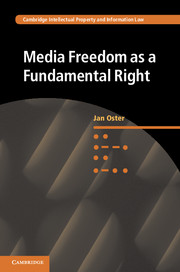Book contents
- Frontmatter
- Contents
- Preface and acknowledgements
- Table of cases
- Treaties, Conventions, Declarations and Statutes
- Reports and other documentary sources
- Introduction: aim, scope and method
- Part I The theoretical foundations of media freedom
- Part II General rules on media freedom
- Part III Specific limitations to media freedom
- 7 Personality rights and intellectual property as ‘rights of others’
- 8 Threats to public order interests: national security, territorial integrity, public safety and prevention of disorder and crime
- 9 The protection of health and morals
- 10 Maintaining the authority and impartiality of the judiciary
- 11 Incitement to hatred
- 12 Religiously offensive publications
- 13 Restrictions on commercial publications
- 14 Media pluralism
- Conclusion: tenets of a Media Freedom Principle
- Bibliography
- Index
- Cambridge Intellectual Property and Information Law
10 - Maintaining the authority and impartiality of the judiciary
from Part III - Specific limitations to media freedom
Published online by Cambridge University Press: 05 June 2015
- Frontmatter
- Contents
- Preface and acknowledgements
- Table of cases
- Treaties, Conventions, Declarations and Statutes
- Reports and other documentary sources
- Introduction: aim, scope and method
- Part I The theoretical foundations of media freedom
- Part II General rules on media freedom
- Part III Specific limitations to media freedom
- 7 Personality rights and intellectual property as ‘rights of others’
- 8 Threats to public order interests: national security, territorial integrity, public safety and prevention of disorder and crime
- 9 The protection of health and morals
- 10 Maintaining the authority and impartiality of the judiciary
- 11 Incitement to hatred
- 12 Religiously offensive publications
- 13 Restrictions on commercial publications
- 14 Media pluralism
- Conclusion: tenets of a Media Freedom Principle
- Bibliography
- Index
- Cambridge Intellectual Property and Information Law
Summary
Unlike Article 10(2) ECHR, Article 19(3) ICCPR, Article 13(2) ACHR and Article 27(2) AfCHPR do not provide a qualification of ‘maintaining the authority and impartiality of the judiciary’. This notwithstanding, provisions protecting order and dignity in court are encompassed by the public order or common interest grounds in these provisions. The purpose of ‘maintaining the authority and impartiality of the judiciary’ is closely linked to the obligations under Article 14 ICCPR, Article 6 ECHR, Article 7 AfCHPR and Article 8 ACHR to ensure fair administration of justice.
The concepts of ‘authority’ and ‘impartiality’ of the judiciary
The term ‘judiciary’ includes both the judicial branch of government as such as well as the judges in their official capacity. ‘Authority’ of the judiciary has an objective and a subjective dimension: objectively, it includes the notion that the courts are the proper forum for the ascertainment of rights and obligations as well as the settlement of disputes; subjectively, courts are accepted and respected by the public at large in their capacity to fulfil that function. ‘Impartiality’ describes the lack of prejudice or bias. The distinction between ‘authority’ and ‘impartiality’ is significant, as an alleged interference with a court's impartiality is even harder to justify than an interference with a court's authority. Impartiality of the judiciary serves to protect the confidence which courts must inspire in the litigating parties and the public at large. Hence, the discourse within the courtroom must not be influenced by the media discourse outside the courtroom. During the legal proceedings, the media's obligation is merely to transport the litigation discourse to the outside world, but not to replace it there. For example, in C. Ltd v. United Kingdom, a TV company intended to broadcast news reports on a high profile criminal trial with actors playing judges, counsel and witnesses.
- Type
- Chapter
- Information
- Media Freedom as a Fundamental Right , pp. 219 - 222Publisher: Cambridge University PressPrint publication year: 2015



